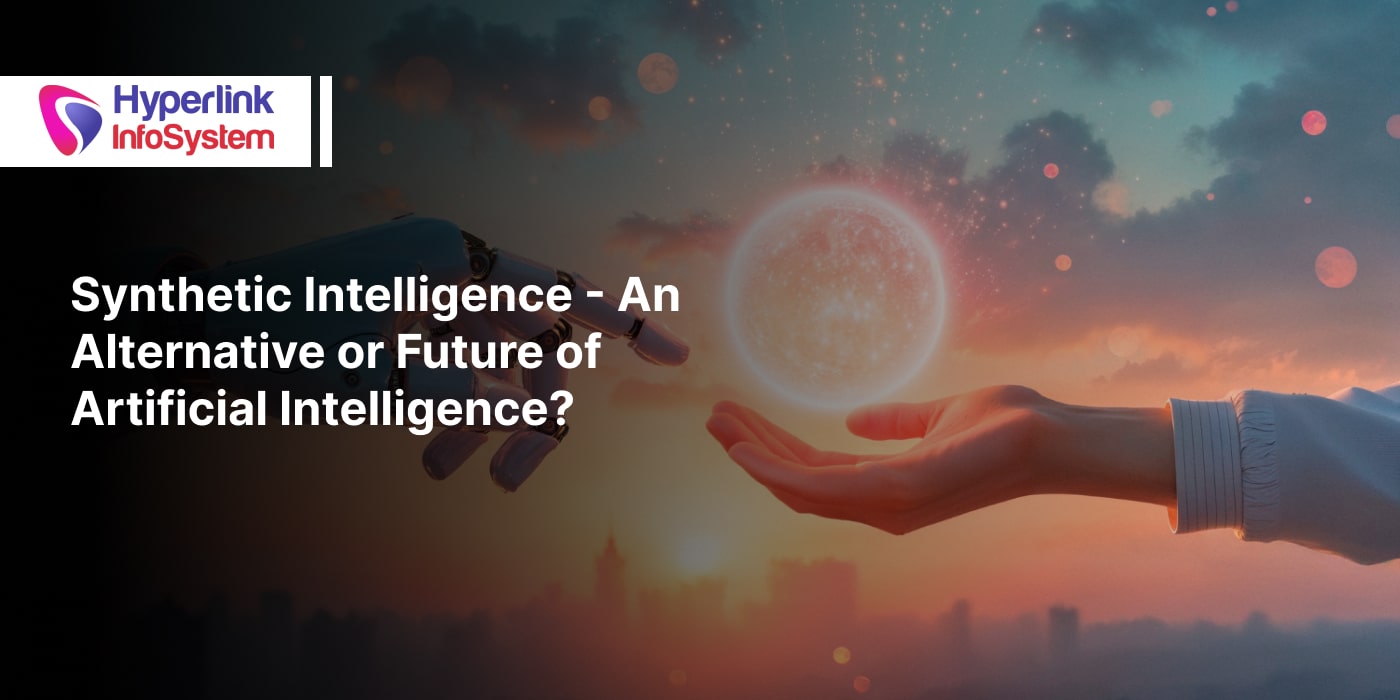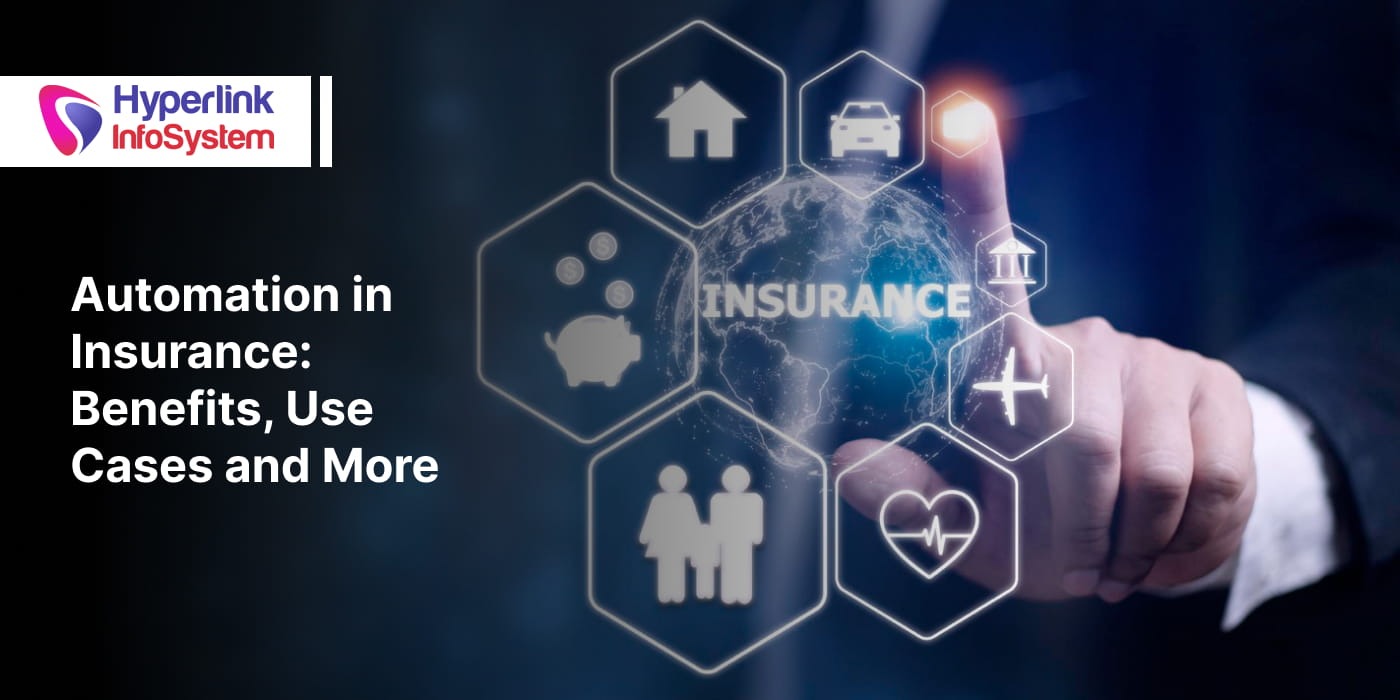Synthetic Intelligence: An Alternative or Future of Artificial Intelligence?
Oct 2025

Summary - When AI entered the scene, many people thought it was the ultimate game-changer and nothing could replace it. Synthetic intelligence is a concept where machines don’t copy the way humans think and act. In fact, artificial intelligence focuses on developing unique intelligence, with no dependence on human abilities. Is synthetic intelligence the next best thing? Will it replace AI? Keep reading to learn more.
What is Synthetic Intelligence?
The global artificial intelligence market was valued at 371.71 billion in 2025. This figure is expected to reach $2407.1 billion by 2032. Whether we like it or not, AI is not just a buzzword anymore. It shapes the way we think, work, live, and interact. From AI-powered Tesla cars to robot-assisted surgeries, AI is at the forefront of innovation in multiple industries. AI’s greatest strength is its extraordinary capabilities to gather and analyze data. Then it extracts valuable insights out of the filtered data, plus it automates repetitive tasks. That said, AI learns from humans and past interactions.
Nobody denies that AI is a remarkable technology and that it can do wonders. Still, we cannot rule out the fact that AI has its flaws. Artificial intelligence does not understand the reasons for a human being’s actions and how they perform them. All it does is copy the outcomes. When a situation changes unpredictably, AI does not have a clue as to how to handle it. It fails miserably. This has forced many experts to think whether AI is the ultimate answer or simply a tool to solve problems.
Synthetic intelligence is an interesting concept that is still in its nascent stages. Unlike AI that merely copies patterns that it has learned from past interactions, synthetic AI can think independently. The ideas and concepts it comes up with are innovative and fresh. Also, synthetic intelligence is said to have goal-setting and context-specific reasoning abilities. As per reports, the synthetic data market was estimated at $764.84 million in 2025 and is expected to reach $3400.23 million by 2030.
Also Read, How AI Voice Ordering Revolutionizes Restaurant Operations
Artificial Intelligence Vs. Synthetic Intelligence
Even though synthetic intelligence is a work-in-progress concept, we must understand how it's different from AI. Many experts see synthetic intelligence as a successor to AI. It is not bound by human intellect or reasoning abilities. Below are the key points of differences between artificial intelligence and synthetic intelligence.
1) Core Idea
- AI - Machines imitate human behavior without understanding the reason. All it does is replicate the results using algorithms and AI models.
- SI - Does not copy human thinking; instead, it focuses on creating a new form of intelligence.
2) Goal
- AI - The main goal of AI is to imitate humans’ learning, reasoning, and decision-making abilities.
- SI - Focuses on creating new types of intelligence that exceed human abilities or are different from them.
3) Method
- AI - Imitates or replicates human behavior using algorithms, machine learning, deep learning, and NLP technologies.
- SI - Uses a combination of computation, biology, and neuroscience to create a new kind of intelligence that doesn’t use AI models based on humans.
4) Philosophy
- AI - The philosophy behind AI is to create a machine that thinks like humans.
- SI - The philosophy lies in creating a machine that thinks differently without relying on human behavior. Aim is to surpass human intellect and perform better.
5) Learning
- AI - AI learns mostly from historical data using models such as deep learning and reinforcement learning.
- SI - Rather than depending solely on old data, SI learns from real-life situations and adapts accordingly.
6) Reasoning
- AI - Reasoning abilities are restricted to the rules, data, and limitations that humans set when designing it for a specific purpose.
- SI - More flexible reasoning capabilities without restricting itself to pre-defined rules or patterns. Encourages thinking independently and adapting to new situations.
7) Current Abilities
- AI - Practical for the most part. Real-world applications include chatbots, recommendations, and automation.
- SI - Still in the theoretical/experimental stage. It's more of a concept than a mature technology.
8) Human-like Capabilities
- AI - Follows patterns but lacks independent thinking ability, emotions, or intent.
- SI - Supposedly more creative, performs actions with intent, and has a deeper understanding.
Want to know more about synthetic intelligence or use it for your next project? Consult a reputed AI development company for the same.
Also Read, AI in Warehouse Management: Challenges, Benefits, Costs
Technologies Used in Synthetic Intelligence
It may seem like synthetic intelligence is a subset or a continuation of AI. However, that is not true. With synthetic intelligence, companies are trying to build systems that can think and act independently, set goals, adapt to new situations, and make informed decisions. Synthetic intelligence’s technologies can be lumped into three categories. These categories include core technologies, enabling tools, and guiding approaches. Below is a short explanation of the same.
1) Core Technologies
Below are the core technologies in synthetic intelligence-based systems.
- Neuro-Symbolic Systems
These systems combine pattern recognition capabilities with the ability to decipher rules and logic. This enables them to think creatively and come up with new ideas.
- Cognitive Architectures
Using frameworks such as SOAR and ACT-R, along with synthetic intelligence-focused models, companies can imitate human behavior. This includes human thinking and learning ability, the ability to remember events/actions, plus continuous learning.
- Generative World Models
With simulation and modeling tools, companies can use synthetic intelligence to create virtual simulations and hypothetical situations. This helps decide the best actions before real-world implementation.
- Embodied Intelligence Platforms
Enables synthetic intelligence systems to integrate with robots, digital twins, and virtual avatars. This reduces dependence on previous data and enables the system to learn from its surroundings.
- Autonomous Agent Frameworks
Synthetic intelligence agents work in a setup where several agents work collectively to make informed decisions and create strategies. A single agent cannot do all of it single-handedly.
2) Enabling Tools
Below are the tools that help build and scale synthetic intelligence systems.
- Self-Supervised and Lifetime Learning
The synthetic intelligence system collects data and constantly learns from various interactions. This eliminates the need for humans to add tags to raw data.
- Reinforcement Learning (RL) and RLHF++
Not just from reinforcement learning, the system learns from its unique experiences and curiosity. This ensures natural discoverability and goal creation.
- Knowledge Graphs and Semantic Networks
Create organized databases of real-world incidents that the AI models can refer to and use for learning. Based on such real data, the SI system can reason accurately without any guesswork.
- Neuromorphic Hardware
Chips like Intel Loihi and IBM TrueNorth work collectively like a bunch of humans. These tiny artificial brains work similarly to quick bursts of electrical currents instead of computing in one go. This ensures that it works faster and expends less power.
- Distributed Cognition Systems
Using cloud and edge systems, the synthetic intelligence system shares collected data related to reasoning, memories, and experiences. This collective intelligence ensures faster and improved problem-solving, decision-making, and challenge-solving.
3) Methodologies and Research Approaches
The methodologies and research approaches dictate how systematic intelligence will proceed in the future.
- Synthetic Goal Formation
Create systems that can create tailored goals based on their unique learning abilities and adaptation to their surroundings. This happens without depending on humans for guidance or instructions.
- Emergent Reasoning Methodologies
Design simple rules for agent interactions. Based on these basic interactions, the system will develop reasoning and intelligent behavior.
- Hybrid Modeling
The perfect blend of AI based on logic, probability models, and neural networks creates a fertile environment for the system to think creatively and logically like human beings.
- Explainability By Design
Interpretability is rooted deeply in synthetic intelligence to explain the reasons for specific decisions or goals.
- Ethical Alignment Frameworks
Teaches synthetic intelligence to understand human behavior and actions. These insights allow it to juggle several goals simultaneously while making wise decisions. Additionally, these decisions ensure business success and safety.
- Iterative Simulation-to-Reality Cycles
Synthetic intelligence agents are tested in virtual environments, enabling them to explore, learn, and adapt to situations. Over time, these experiences will ensure better performance in real-life situations.
Pros and Cons of Synthetic Intelligence
Synthetic intelligence is an interesting concept that has immense potential to transform people’s lives and businesses. Below are the pros and cons of SI.
Pros of Synthetic Intelligence
- Has the ability to reason and make informed decisions like humans.
- Comes up with innovative ideas rather than depending on historical data.
- Adapts to changing circumstances or when exposed to unfamiliar things.
- It sets unique goals and decides the further course of action instead of allowing humans to dictate terms.
- Solves challenges in complicated, real-world situations/industries with no fixed rules or guidance.
Cons of Synthetic Intelligence
- Remains a theoretical concept with no evidence of it working in real-world applications.
- Raises moral or safety issues without human guidance or intervention.
- Doubts lie over its credibility compared to conventional AI.
- Creating SI requires cutting-edge tech, research, knowledge, and significant infrastructure investments.
- Systems can exhibit unpredictable behavior or make bad decisions.
Use Cases of Synthetic Intelligence
Synthetic intelligence uses computer-generated data that imitates human behavior, patterns, and real-world data. This makes it a powerful asset for companies in different industries. Below are some of the key use cases of synthetic intelligence.
1) Healthcare
- Faster Drug Development - Researchers can use artificial patient data to conduct drug tests. This speeds up trials without risking human lives.
- Enhanced Diagnostic Models - Hospitals and healthcare professionals can train AI to identify symptoms of diseases using synthetic patient images. This enhances the accuracy of diagnoses.
2) Finance and Banking
- Fraud Detection and Risk Modeling - Banks and financial institutions can use dummy transactions to train AI in fraud detection. Client money is not used during this process.
- Regulatory Compliance - Financial institutions and banks can use synthetic data to test financial risks and new rules while ensuring the safety of client data.
3) Autonomous Robots and Systems
- Vehicle Simulation - Self-driving car manufacturers can test the performance of their products in virtual environments using artificial roads and scenarios.
- Robot Training - Robots learn to perform specific tasks in virtual environments, such as moving objects, assembling parts, and more. This ensures they don’t make mistakes in real life.
4) Manufacturing and Industry 4.0
- Predictive Maintenance - Synthetic data models help monitor equipment performance. This enables manufacturers to predict potential machine breakdowns and schedule maintenance accordingly.
- Supply Chain Optimization - Companies generate supply chain-related data, which is tested and fine-tuned to create logistics strategies. This ensures efficient and reliable business operations.
5) Education and Training
- Adaptive Learning Systems - Educational institutions can generate synthetic student data to tailor learning experiences. This ensures that every student’s needs are taken care of, and results improve.
- Simulation-Based Training - Synthetic data-based scenarios are used to train individuals in different professions. This ensures they can practice their skills before entering the real world.
6) Agriculture
- Precision Farming - Using synthetic data, agriculturalists can optimize their activities, including sowing, irrigation, and pest control schedules. This ensures the best results.
- Climate Modeling - Synthetic datasets imitate diverse environmental conditions. These insights help with climate change research and develop strategies to handle it.
Want to use synthetic data for your business but are unsure about how to go about it? Hire dedicated AI developers for your project or team up with a professional AI development company.
What the Future Holds for Synthetic Intelligence
Synthetic data can be a huge asset for companies. Still, generating synthetic data is not straightforward. The data can be inaccurate or skewed. Hence, it is crucial to clean the gathered data before using it for testing in the virtual world. Privacy is also a major concern. Leaked customer data can compromise security while adversely affecting trust and goodwill. Most importantly, training multiple AI models can be time-consuming and tedious for them.
Protecting data and ensuring regulatory compliance is not easy but any means, but companies must do it to ensure compliance. Many companies are hesitant to leverage the power of synthetic data because of privacy and regulatory concerns. It is advisable for companies to hire a reputable artificial intelligence development company that can navigate these challenges while ensuring successful outcomes.
We've covered numerous points related to synthetic data in this blog, but it's important to understand that every company is unique. Hence, systematic data must be tailored to meet the specific needs of companies. Finally, companies must remember that synthetic data is an evolving technique that has a long way to go. Depending on it exclusively may not be the right strategy.
The secret lies in adopting a foolproof strategy that combines hybrid datasets, continuous validation, and careful monitoring.
Frequently Asked Questions
In order to make the best use of synthetic data in companies, the management must hire AI developers with the following skills.
- Robust AI/ML Knowledge
- Systems Thinking
- Cognitive Modeling Skills
- Data and Experimentation Proficiency
- Ethical Judgment
- Curiosity about SI
- Adaptation to new concepts and research
Using synthetic intelligence is not just about using advanced technologies. It's about AI that thinks and acts like humans without following pre-set patterns. It makes decisions independently, sets time-based goals, and solves problems while considering the circumstances. So to answer your question, synthetic intelligence is a powerful tool for digital transformation.
Hire dedicated developers in India is a great option for companies. This is because the exchange rate ensures that companies get reasonable services without compromising quality. India has a large talent pool with many individuals prioritizing creativity and innovation. Also, many cities in India have excellent infrastructure that attracts the brightest minds. Also, outsourcing the project to Europe or America may not be cost-effective for all.
The average hourly rate to hire dedicated AI developers depends on the project complexity. The development team and location also matter a lot. Below are the hourly rates to hire AI developers in different geographical locations.
- North America - $100 - $300
- Europe - $45 - $200
- India - $20 - $60
- Asia - $30 - $70
Tech, financial services, healthcare, manufacturing, retail, education, and other businesses must consider using synthetic intelligence. In short, companies that handle complex systems, operate in dynamic environments, perform creative tasks, or indulge in high-stakes decision-making should think about using synthetic intelligence.
Latest Blogs

Is BlockChain Technology Worth The H ...
Unfolds The Revolutionary & Versatility Of Blockchain Technology ...


IoT Technology - A Future In Making ...
Everything You Need To Know About IoT Technology ...

Feel Free to Contact Us!
We would be happy to hear from you, please fill in the form below or mail us your requirements on info@hyperlinkinfosystem.com
Hyperlink InfoSystem Bring Transformation For Global Businesses
Starting from listening to your business problems to delivering accurate solutions; we make sure to follow industry-specific standards and combine them with our technical knowledge, development expertise, and extensive research.
4500+
Apps Developed
1200+
Developers
2200+
Websites Designed
140+
Games Developed
120+
AI & IoT Solutions
2700+
Happy Clients
120+
Salesforce Solutions

40+
Data Science

















